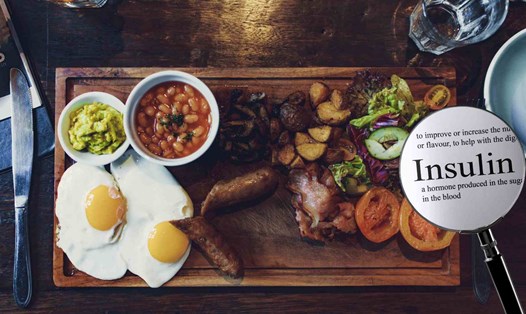1. Reduce carbohydrate intake
Carbohydrates, especially refined sugars, cause a rapid rise in blood sugar, which causes the body to produce insulin to balance it out. Long-term consumption of refined sugars can lead to insulin resistance. Replace refined carbohydrates with whole foods like vegetables, quinoa, and beans to lower blood sugar and stabilize insulin levels.
2. Practice intermittent fasting
Intermittent fasting is a popular weight loss and metabolism-boosting strategy. Alternating between periods of eating and fasting not only helps you lose weight but also lowers your insulin levels, according to a 2022 study in the International Journal of Endocrinology. The fasting periods help your body recover and improve insulin sensitivity, reducing stress on your pancreas.
3. Exercise regularly
Lack of exercise is a big contributor to high insulin levels. Research published in Frontiers In Physiology (2022) shows that regular exercise, even light exercise, helps reduce insulin and increase insulin sensitivity. Exercises like walking, yoga, or hitting the gym all help metabolize glucose more efficiently.
4. Avoid sugary drinks
Sodas and processed foods are the main culprits in causing insulin spikes. Even diet sodas are no good, as they still spike insulin levels, according to a 2023 study in Food Research International. Replace them with water, tea, or natural juices to stay healthy.
5. Incorporate healthy fats
Dr. Sundar says that healthy fats like avocados, nuts, and olive oil don’t cause spikes in blood sugar and help stabilize insulin. However, unhealthy fats should be avoided because they can cause insulin resistance.
6. Stay hydrated
Drinking water is not only good for your kidneys, but it also helps eliminate excess sugar through urine, helping to regulate insulin. Research in the International Journal of Exercise Science (2016) shows that drinking enough water every day significantly reduces insulin levels.
7. Manage stress levels
Chronic stress causes the body to secrete cortisol, which causes blood sugar to rise, leading to increased insulin production. To reduce stress, practice meditation, yoga, or deep breathing in the morning and evening. This is a simple but effective way to keep your mind relaxed and improve your health.
8. Get enough sleep
Quality sleep plays an important role in hormone regulation. Irregular sleep patterns or lack of sleep increase insulin resistance. Make sure you get 7-8 hours of sleep each night to help your body recover and stabilize insulin.
9. Use dietary supplements
Some supplements, such as magnesium and chromium, help improve insulin activity. Magnesium improves insulin sensitivity, which is especially effective in people with magnesium deficiency. However, it is best to consult your doctor before using it to ensure safety.
10. Drink apple cider vinegar
Apple cider vinegar may help reduce insulin spikes after meals. Mix 1-2 tablespoons of apple cider vinegar with water and drink it before meals to stabilize blood sugar, according to a 2015 study in the Journal of Diabetes Research.











